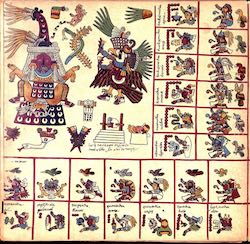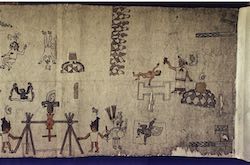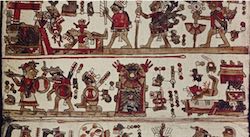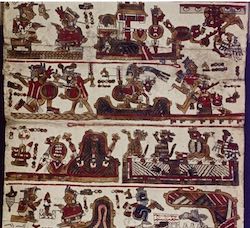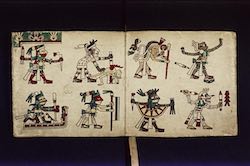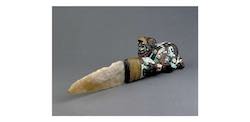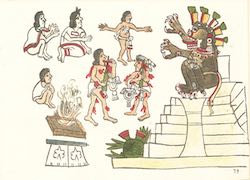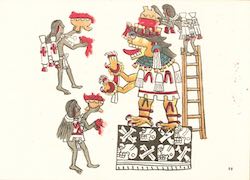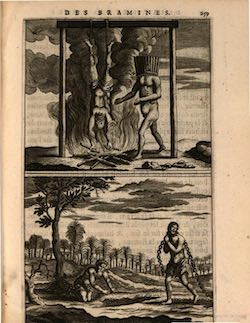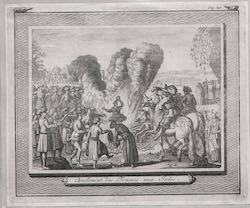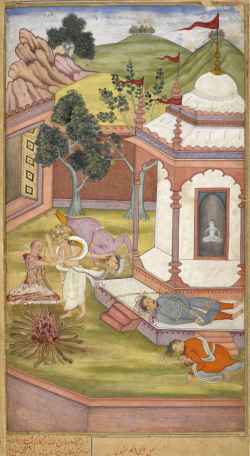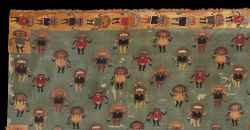Topic: 2. Sacrifice and religion: Comparisons, Antiquarians, Anthropology (16th-18th Century)
Religious sacrifices across various cultures and contexts sparked widespread interest in Early Modern Europe. As Christianity expanded into regions inhabited by "infidels" and "pagans", Europeans encountered a diverse array of sacrificial customs, ranging from the Sati rituals in India to the Aztec sacrifices in the Americas. This cross-cultural exposure captivated a wide audience, including theologians, philosophers, political thinkers, antiquarians, orientalists, missionaries, poets, artists, and even the general public. These encounters broadened the European understanding of sacrifice and led to a critical reassessment of classical and biblical sacrificial rites. This section includes:
- Sources: A selection of early modern printed materials, which include descriptions of the Americas, Asia, and Africa, alongside antiquarian and philological studies on religious sacrifice in classical antiquity and beyond. It also presents early modern works of ethnological observations and the first attempts to compare different sacrificial practices in various traditions and contexts, laying the groundwork for disciplines like the history of religions and anthropology.
- Iconographic Representations: A rich collection of images from the 16th to 18th centuries, illustrating a range of sacrificial rituals and practices as seen in different cultural and geographical contexts.
- Related Bibliography: An extensive bibliography spanning scholarly works from the 19th to 21st centuries, providing contemporary analyses and interpretations of these early studies and observations.
Aztec Ritual with Human Linbs [1501 - 1525]
from: Codex Borbonicus
Bibliothèque de l'Assemblée Nationale, Paris
Aztec Sacrifice 1 [1501 - 1550]
from: ms. Arch. Selden. A. 72 (3)
Bodleian Library, Oxford
Aztec Sacrifice 2 (1556)
from: ms. Arch. Selden. A. 2
Bodleian Library, Oxford
Aztec Sacrifice 3 (1556)
from: ms. Arch. Selden. A. 2
Bodleian Library, Oxford
Aztec Sacrifice 4 (16th Century)
from: ms. Laud Misc. 678
Bodleian Library, Oxford
Aztec Sacrifice 5 (16th Century)
from: ms. Laud Misc. 678
Bodleian Library, Oxford
Aztec Sacrifice 6 (16th Century)
from: ms. Laud Misc. 678
Bodleian Library, Oxford
Aztec Sacrifice in front of a Pyramid [1562]
from: Codex Telleriano - Remensis
Bibliotèque Nationale de France, Paris
Aztecs do Penance, cutting their Ears and Tongues [1526 - 1550]
from: Codex Magliabecchiano, c. 79r
Biblioteca Nazionale di Firenze, Florence
Aztecs offer Blood to their Principal God [1526 - 1550]
from: Codex Magliabecchiano, c. 88r
Biblioteca Nazionale di Firenze, Florence
Aztecs offer Incense and Dirty Paper of Blood [1526 - 1550]
from: Codex Magliabecchiano, c. 74r
Biblioteca Nazionale di Firenze, Florence
Barbaric Sacrifice of the Mexicans (1770)
from: Jean-François de La Croix, Dictionnaire historique des cultes religieux établis dans le monde depuis son origine jusqu'à présent... - Paris : Vincent, 1770, vol. 3, part. 2, p. 42
Bibliothèque nationale de France, Paris
Brahmin undergoing the test of fire after prolonged penance and yoga practices; Yogi dragging heavy iron chains; and a man tied to a tree who has chosen to embrace death (1670)
from: Abraham Rogerius, Le Théâtre de l’idolatrie ou la porte ouverte, Amsterdam, Jean Schipper, 1670, p. 252
Brulement des femmes (1700)
http://www.columbia.edu/itc/mealac/pritchett/00routesdata/1800_1899/hinduism/sati/sati.html
Candrahasa sacrifices himself cutting off pieces of his own flesh and putting them on the fire [1598]
from: Razmnāmah by Abhinanda, India (The last volume of the Persian translation of the Mahābhārata commissioned in 990 by Akbar)
London, British Library, Or 12076 folio: 90v
Ceremony of Burning a Hindu Widow (19th century)
http://www.columbia.edu/itc/mealac/pritchett/00routesdata/1800_1899/hinduism/sati/sati.html
Chased from Chapultepec, the Aztecs, led by their chief Tenoch, offer gifts to the king of Colhuacan and settle in the city; above, a group witnessing a sacrifice ceremony (ca 1596)
from: Tira de Tepechpan [Ms Mexicain 13–14, planche 4]
Bibliothèque nationale de France, Paris

